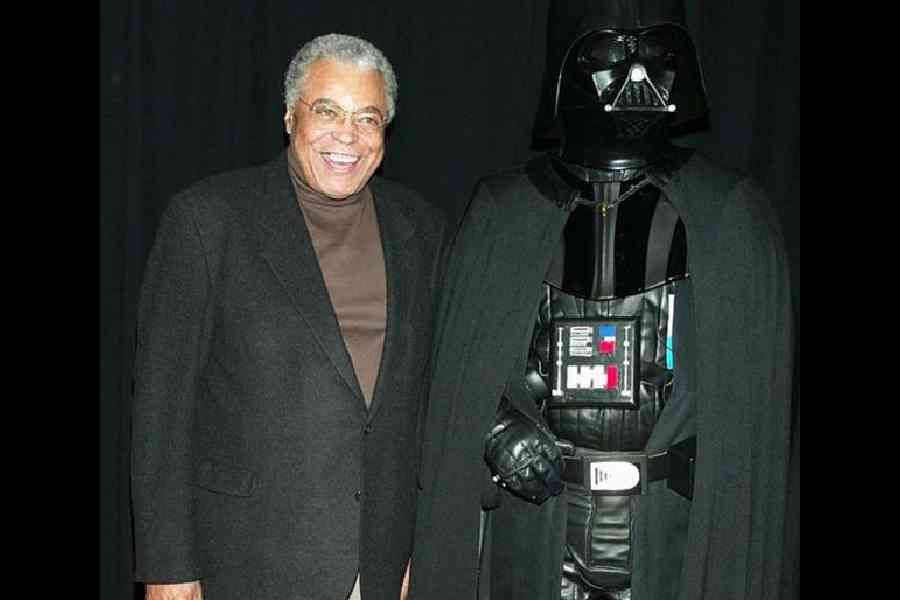To his voice belongs what are perhaps two of the most important characters in cinema history. James Earl Jones, the man who most famously lent his voice to the Star Wars villain Darth Vader across films and TV, and also became the voice that defined Mufasa in The Lion King, died on Monday. He was 93. Jones died at his home in New York, according to an announcement from his representatives. No cause of death was provided.
A man who commanded respect and love both behind the microphone and in front of the camera, Jones amassed hundreds of credits on the stage and screen in his seven-decade-long career, managing to imbue his characters with both humanity and charisma. He belonged to the rare category of actors who received Tony, Emmy, Grammy and Academy awards, the latter being an honorary Oscar in 2011 citing “his legacy of consistent excellence and uncommon versatility”.
Jones made his acting debut as a bombardier in Stanley Kubrick’s iconic antiwar film Dr. Strangelove (1964) and brought alive many other memorable characters on screen. But it was as the sonorous, gravelly voice of the sinister Darth Vader that he is best remembered and loved for across generations. It is all the more remarkable because he had a stammer well into his high-school years. “I was a stutterer. I couldn’t talk. So my first year of school was my first mute year, and then those mute years continued until I got to high school,” Jones had once revealed.
Jones voiced Vader in George Lucas’s trilogy comprising Star Wars (1977), The Empire Strikes Back (1980) and Return of the Jedi (1983). He reprised it in Star Wars: Episode III: Revenge of the Sith (2005), Rogue One: A Star Wars Story (2016), Star Wars Episode IX: The Rise of Skywalker (2019) and on TV with Obi-Wan Kenobi and Star Wars: Rebels. “No, I am your father” remains one of the most beloved lines in the annals of cinema.
However, he wasn’t the first choice. David Prowse, the man originally behind the mask, had a strong West Country accent that lacked menace. Replacing Prowse, Jones was brought behind the mic. At his own insistence, Jones was not given a credit for his performance. He felt it was all merely another “special effect”. When the films broke all box-office records, he was persuaded to rethink. We are glad he did.
“James was an incredible actor, a most unique voice both in art and spirit,” said George Lucas, the creator of Star Wars. He added: “For nearly half a century, he was Darth Vader, but the secret to it all is he was a beautiful human being. He gave depth, sincerity and meaning to all his roles....” Mark Hamill, famous as Luke Skywalker in Star Wars, posted on X: “RIP Dad”.
That distinctive voice also brought alive Mufasa in Disney’s The Lion King, father of princeling cub Simba. Jones’s voice lent both dignity and benign innocence to Mufasa’s speech explaining to wide-eyed Simba his royal responsibility to the great chain of being: “Everything you see exists together in a delicate balance. As king, you need to understand that balance and respect all the creatures, from the crawling ant to the leaping antelope....”
“From the gentle wisdom of Mufasa to the menacing threat of Darth Vader, James Earl Jones gave voice to some of the greatest characters in cinema history,” said Bob Iger, chief executive officer of The Walt Disney Company, in a statement. “A celebrated stage actor with nearly 200 film and television credits to his name, the stories he brought to life with a uniquely commanding presence and a true richness of spirit have left an indelible mark on generations of audiences.”
Such was the authority in his voice, Jones became a stalwart of commercial voice-overs, documentaries and computer games. He was the voice of SeaWorld in Florida and NBC’s Olympic coverage. He was the voice of CNN’s “This is CNN” tagline. And though he did play a fictional US President, the first African-American to occupy the White House in the 1972 film The Man, he never used his famous voice to endorse politics or politicians, even when approached more than a few times.
“My voice is for hire,” he once said. “My endorsement is not for hire. I will do a voiceover, but I cannot endorse without making a different kind of commitment. My politics are very personal and subjective.”
Equally prolific on stage (he tackled many iconic Shakespeare characters, including Othello and King Lear) and screen, Jones’s film credits include playing the leader of a snake cult in Conan the Barbarian (1982); an aging coal miner who casts his lot with 1920s-era strikers in Matewan (1987); the father of African princeling Eddie Murphy in the comedy Coming to America (1988); a cantankerous literary recluse in the baseball fantasy Field of Dreams (1989); a blind former ballplayer in The Sandlot (1993); and a South African priest tracking down his missing son in Cry, the Beloved Country (1995).
He won the Tony Award for Best Actor in a Play for his role as a boxer in The Great White Hope (1968), which he reprised in the 1970 film adaptation, that earned him an Academy Award nomination, becoming only the second Black man nominated for an Oscar for Best Actor, after Sidney Poitier.
He continued working even in the later years of his life, never quite hanging up his boots, his spirit always defined by these lines he had once said: “Denzel Washington, Sidney Poitier, Robert Redford, Tom Cruise: those guys have well-planned careers. I am just on a journey. Wherever I run across a job, I say: ‘Okay, I will do that’.











